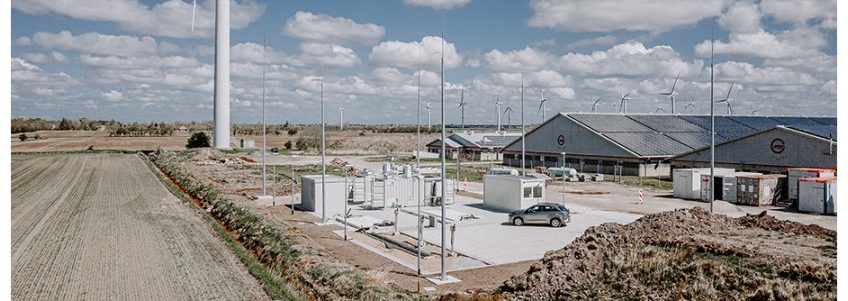eFarm signals the start of the largest green hydrogen mobility project in Germany to date – with support totalling €8 million under the NIP funding programme. The implementation of the National Hydrogen Strategy has already begun within NIP. With NIP funding measure Hyland, the development of integrated regional hydrogen concepts continues and expands.
Berlin, 7 July 2020 – The inauguration of the hydrogen production facility in Bosbüll signals the start of eFarm, the largest green hydrogen mobility project in Germany to date. The GP JOULE Group is implementing a hydrogen infrastructure in North Frisia – from generation and processing through to fleet use within the group. The Federal Ministry of Transport and Digital Infrastructure (BMVI) has granted investment support under the National Innovation Programme for Hydrogen and Fuel Cell Technology (NIP) of a total of 8 million euros for five hydrogen production locations, two hydrogen refuelling stations, two fuel cell buses and five fuel cell cars. eFarm is collaborative, sustainable businesses with renewable energies in a region and as an initial, integrated market concept, signals the next important step towards a hydrogen economy. This shows that the implementation of the National Hydrogen Strategy has already begun with the NIP funding programme.
The promising eFarm concept has already found successor projects to build upon this approach: with “Hyland – hydrogen regions in Germany”, the BMVI is funding the creation, refinement and implementation of integrated regional hydrogen concepts. There are of course, different requirements in different regions, but the initiatives show that the development of a green hydrogen economy is possible everywhere. The projects in the regions are to serve as models for further development on the federal level.
Funding in NIP has been running since 2006. By 2016 around 700 million euros of funding was granted. By 2016 another 1.4 billion euros will be allocated in order to achieve a real market ramp-up of hydrogen technology. For many of the measures mentioned in the recently introduced National Hydrogen Strategy of the federal government, NIP provides a solid basis and useful points of connection. In the transport area in particular, an excellent body of expertise has been built up within the programme coordination by NOW GmbH. For example with NIP, the cornerstone for existing hydrogen refuelling stations in Germany was laid. With 84 hydrogen refuelling stations, Germany occupies second place when compared internationally. Other points of focus include the strengthening of the supply industry or the support for secondary products (PtX) manufactured from hydrogen. The hydrogen strategy acknowledges these priorities and brings additional impetus to their continued implementation.


